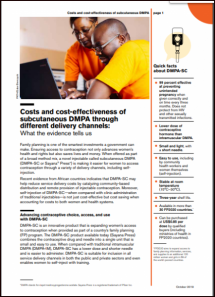Costs and Cost-effectiveness of Subcutaneous DMPA through Different Delivery Channels: What the Evidence Tells Us
Recent evidence from African countries indicates that DMPA-SC may help reduce service delivery costs by catalyzing community-based distribution and remote provision of injectable contraception. Moreover, self-injection of DMPA-SC—when compared with clinic administration of traditional injectables—is not just cost-effective but cost saving when accounting for costs to both women and health systems.
New evidence shows that women who self-inject DMPA-SC continue using injectable contraception longer than those who receive injections from providers, which translates to fewer unintended pregnancies.
Source: PATH
Date of Publication: September 20, 2020
SIMILIAR RESOURCES
Tools
Examples
- Self-Care: A Cost Effective Solution for Maternal, Newborn & Child Health for All
- WHO Consolidated Guideline on Self-care Interventions for Health: Sexual and Reproductive Health and Rights
- Who Self-Cares Wins
- Self-Care: Better Daily Health for Individuals and Societies
- Advocacy Roadmap - Igniting a Self-Care Movement for Sexual and Reproductive Health
- Self-Care Quality of Care Framework
- Home-Based Care Reference Guide for COVID-19
- Acceleration of Self-Care in the Time of COVID-19
- Going Online to Accelerate the Impact of HIV Programs
- Documenting the Costs of Social Behavior Change Interventions for Health in Low- and Middle-income Countries
- Is Contraceptive Self-injection Cost-effective Compared to Contraceptive Injections from Facility-Based health Workers? Evidence from Uganda
- Self-Care in Sexual and Reproductive Health and Rights: A New Frontier in Healthcare
- Journey to DMPA-SC in the Sahel
- 7 Acts of Self-care You Can Practice during a Winter Lockdown
- Investing in Social and Behavior Change is Cost-effective for Improving Malaria Behaviors in Côte d’Ivoire

